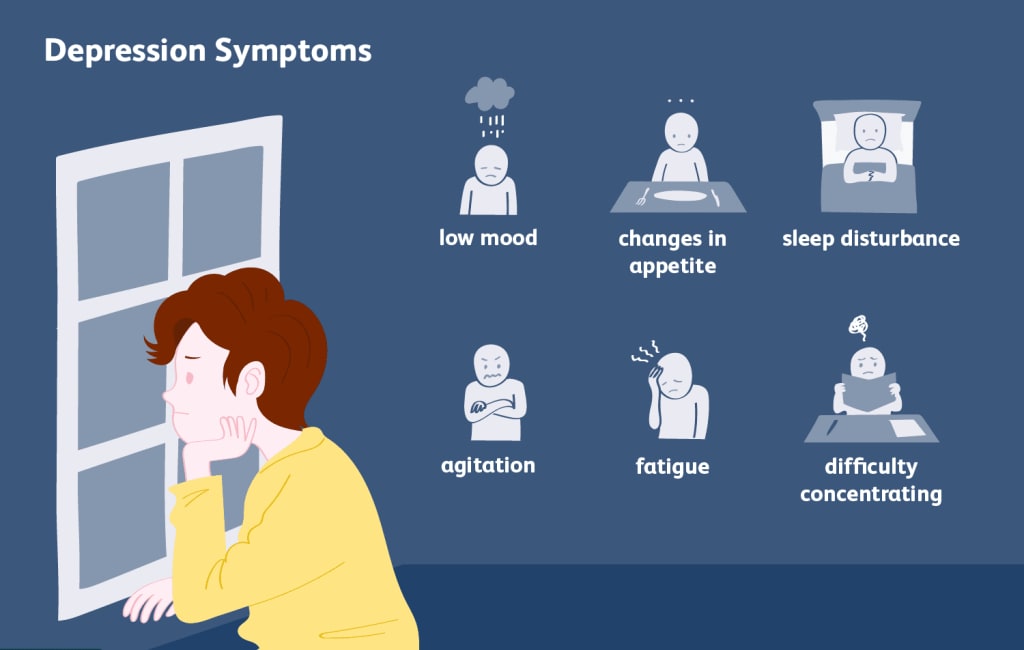Mastering Your Mindset: A Pathway to Healing from Depression
"Transform Your Mindset, Heal from Depression"

I. Introduction
Millions of people around the world are impacted by depression, which is a significant mental health disorder. While there is no one-size-fits-all solution to overcoming depression, research suggests that developing a positive mindset can be an effective tool in managing symptoms and promoting recovery. In this article, we'll explore the key principles of mindset and how they relate to depression, as well as practical strategies for developing a more positive and resilient attitude. By learning about and practicing a positive mindset, individuals struggling with depression can learn to cope with stress and setbacks more effectively, build better relationships, and find greater meaning and purpose in life. Let's dive in!
II. Mindset and Depression: Understanding the Connection
A. Definition and causes of depression
Depression is a mental health condition characterized by persistent feelings of sadness, hopelessness, and loss of interest in enjoyable activities. It can be caused by biological factors such as brain chemical imbalances and genetics, environmental factors such as life stressors and lack of social support, and psychological factors such as negative self-talk and low self-esteem. Understanding the definition and causes of depression is important for recognizing symptoms and seeking appropriate treatment.
B. The role of mindset in depression
Mindset plays a crucial role in depression, as negative thinking patterns and a lack of hope or optimism can worsen symptoms and prevent recovery. Developing a positive mindset can help individuals manage depression by cultivating resilience, optimism, and a belief in one's ability to overcome challenges.
C. The link between negative thoughts and depressive symptoms
Negative thoughts and depressive symptoms are closely linked, as negative thinking patterns can worsen and prolong feelings of sadness, hopelessness, and low mood. By addressing and challenging negative thoughts, individuals can learn to manage depressive symptoms and improve their mental health.
D. The benefits of developing a positive mindset in managing depression
Developing a positive mindset can have numerous benefits in managing depression, including increased resilience, improved mood, and greater motivation to engage in activities that promote well-being. By cultivating optimism and a belief in one's ability to overcome challenges, individuals can better manage depressive symptoms and work towards recovery.
III. Strategies for Developing a Positive Mindset
A. Identify negative self-talk and cognitive distortions
Identifying negative self-talk and cognitive distortions is an important step in managing depression and promoting positive mental health. By recognizing and challenging these negative patterns of thinking, individuals can begin to change their thought processes and improve their mood and overall well-being.
B. Practice self-compassion and gratitude
Practicing self-compassion and gratitude can help individuals with depression cultivate a more positive mindset and improve their mental health. By treating oneself with kindness and focusing on what one is grateful for, individuals can reduce negative thinking patterns and increase feelings of positivity and well-being.
C. Engage in positive activities and relationships
Engaging in positive activities and relationships is a powerful way to manage depression and promote positive mental health. By participating in activities that bring joy and spending time with supportive people, individuals can increase feelings of happiness, reduce stress, and cultivate a more positive mindset.
D. Focus on solutions and opportunities, not problems and limitations
Focusing on solutions and opportunities, rather than problems and limitations, can help individuals with depression develop a more positive mindset and improve their mental health. By reframing negative thoughts and focusing on solutions, individuals can feel more empowered to act and work towards their goals, which can lead to greater feelings of hope and motivation.
IV. Putting it into Practice: Tips and Tools for Mastering Your Mindset
A. Journaling and reflective exercises
Journaling and reflective exercises can be helpful for managing depression and improving mental health. By writing down thoughts and feelings, individuals can gain insights into their emotional state and identify negative patterns of thinking. Reflective exercises can also help individuals reframe negative thoughts and focus on positive aspects of their life, which can lead to greater feelings of well-being.
B. Mindfulness and meditation practices
Mindfulness and meditation practices can be effective tools for managing depression and improving mental health. By focusing on the present moment and cultivating a non-judgmental attitude, individuals can reduce stress and increase feelings of calm and relaxation. Regular mindfulness and meditation practices can also improve emotional regulation and help individuals manage negative thought patterns, which can lead to improved mental health outcomes.
C. Self-care and stress-management techniques
Self-care and stress-management are crucial for managing depression. Activities like exercise, healthy eating, and sleep can reduce stress and improve mood. Deep breathing and relaxation techniques, along with time management strategies, are also effective for managing symptoms and improving mental health.
D. Building a support network and seeking professional help
Building a support network and seeking professional help are crucial for managing depression. Connecting with supportive friends and family can increase social support and reduce feelings of isolation. Seeking therapy or medication can also be effective in managing symptoms and promoting positive mental health outcomes.
V. Conclusion: The Power of Mindset in Healing from Depression
A. Recap of the Article's main points
Article highlights the importance of a positive mindset for managing depression and promoting positive mental health outcomes. It covers the definition and causes of depression, the role of mindset in depression, and practical tips for developing a positive mindset. The article also emphasizes seeking professional help and building a support network.
B. Call to action for readers to take steps towards developing a more positive mindset
I encourage readers to act towards developing a more positive mindset to support their mental health and well-being. By practicing the strategies outlined in this article, such as identifying negative self-talk, engaging in positive activities and relationships, and cultivating a growth mindset, individuals can promote positive mental health outcomes and work towards recovery from depression. Remember, developing a positive mindset is a process that takes time and effort, but the benefits are well worth it. Start taking small steps today towards cultivating a more positive and growth-oriented mindset, and you'll be on your way towards a happier and healthier you.
C. Final words of encouragement and support
Remember, recovery from depression is possible, and developing a positive mindset is an important step towards achieving this goal. It's okay to reach out for help and support along the way, whether it's from friends, family, or a mental health professional. Keep in mind that small steps towards cultivating a positive mindset can make a big difference in your mental health outcomes. Be kind to yourself, practice self-compassion, and believe that you can make progress towards a happier and healthier you. With effort and persistence, you can develop a more positive mindset and work towards recovery from depression.
About the Creator
Rafeeq Ismail
Rafeeq Ismail(Civil Engineer) a seasoned writer producing quality content on a variety of topics such as Health &Fitness, Motivation, Sports etc. Dedicated to delivering well-researched, engaging articles that inform and entertain readers.






Comments
There are no comments for this story
Be the first to respond and start the conversation.